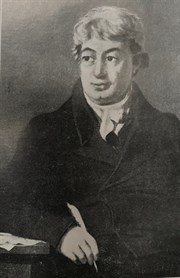Dr John Hull
The founding President of Manchester Medical Society
John Hull (1761-1843) was born at Poulton-le-Fylde, Lancashire and was orphaned at an early age. At sixteen he became apprenticed to Mr Joseph Lancashire, a surgeon, man-midwife, and apothecary in Blackburn, Lancashire. Hull went to London and qualified with the Corporation of Surgeons in 1784. He then returned to Blackburn where he went into partnership with his former master, Mr Lancashire, and his success there enabled him to buy the practice.

He moved to Manchester in 1796 to develop his interest in obstetrics. He became a highly respected obstetrician who was engaged in active debate about best practice. He believed that caesarean sections were sometimes necessary and was supported in his view by the staff of the Lying-in Hospital, now St Mary's Hospital. He was however criticised by staff at the Manchester Royal Infirmary, in particular William Simmons, who published an attack on the operation. Hull in turn published a response and the debate continued for several years.
Hull joined the staff of the Manchester Lying-in Hospital in 1804 and was awarded the new senior post of physician in 1805 which he held until he retired in 1837.
Although never known to have been involved in the teaching, Hull made great efforts to see that lectures at Jordan's new medical school were recognised, and thus played a part in the establishment of the first provincial medical school.
He was an active member of the Manchester Literary and Philosophical Society, which at the time was the only real place where Manchester physicians and other members of the medical profession could meet and discuss professional issues. It was here where the controversies over the caesarean section played out, and Hull was co-secretary for many years before being elected president in 1809.
Hull headed up the initiative to establish the Manchester Medical Society in 1834 and notably served as their first president from 1834 to 1838. Upon its foundation Hull presented a large number of books to the Society to help establish what would eventually become a very large library.
In addition he was a keen botanist, a role for which he was well known and is evidenced through some of his publications and his surviving manuscripts. He was also a fellow of the Linnaean Society. Hull was a highly educated man and was well versed in Latin, Greek, French, German, and Italian.
Hull died on 17 March 1843 at Tavistock Square, London, the house of his eldest son, William Winstanley Hull (1794-1873) who became a noted liturgical writer and hymnologist.
More information about Dr John Hull in the Manchester Medical Collection